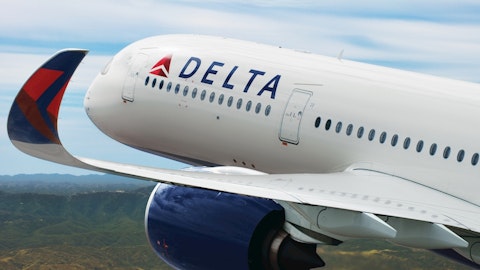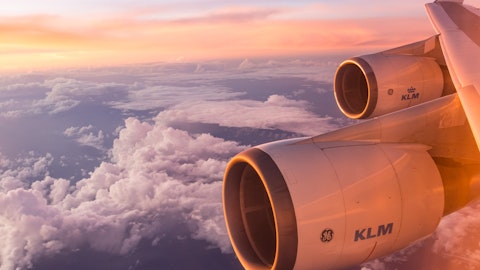Michael O’Leary: Thanks. Two good questions here. I think, slightly it is an interesting situation. Look, they’re pretty small. I mean what slightly demonstrate is the incompetence of the CAA’s regulatory function. I mean Fly BE should never have been allowed to get back in the air last year, having originally gone cost. They were never properly financed and the CAA, which is supposed to protect consumers by ensuring that you have airlines adequately financed in the U.K., continues to demonstrate its own competence in exercising its regulatory bump. However, it has gone. It is material. I mean, as a couple of the airports where we operate, like we’re going into Belfast this year to be fair, we’re going into Belfast because the government has finally cut the domestic or domestic APD.
Their second biggest airport is Birmingham, where we are the biggest airline there, and we will certainly be in talks already with Birmingham about expanding. And I think there will be some additional slots that will come up in Manchester, where I think we will continue to expand and are allocating more aircraft. But in structural terms, they’re so small. It’s not going to make a lot of difference. It’s reasonably helpful to our entry into Belfast and our growth in places like Manchester, Birmingham. But a lot of what Fly BE was doing was kind of domestic U.K. stuff. And that’s not a big market for us, although it’s not on help. On the package holiday side, I really don’t pay much attention to the package holiday side. I think Jet 2 is a good operation well run.
I remain hugely skeptical of EasyJet’s holiday operation. I never believe any of the profit figures they declare. I think it’s just a reallocation of yields into some — into their holiday operation. But be that as it may, I don’t — we’re making enough money flying people around Europe short-haul, point-to-point, with a widening unit cost gap over everybody else. The last thing I need to be doing now is setting up an operation, negotiating for bedrooms and accommodation at all these places. It’s a different marketplace. If you look at the performance of package holidays in Europe in the last number of years, TUI (ph), Thomas Cook, they’ve all gone posted various days. They’ve all need to be bailed out of various ages — the Internet has completely disintermediated the package holiday business.
There will always be a role for some element of package holidays. But for example does very well in Poland, where that market is growing, and the Poles are wedded to kind of package holidays. But over time, the demand for packaged holidays declines as you get more and more availability of low cost point-to-point air travel. And people just put together their own packages. That’s not to say there isn’t a role for the package holiday business. But I think it would just be a distraction to us continue to execute our business plan, which is to grow our fleet, grow our traffic to 225 million passengers over the next four years and do so in a manner that widens our unit cost leadership over the likes of Weeze and EasyJet and all the others and continue to take meaningful market share from everybody else.
I think there’s a role in certain niche markets for packaged holidays, but that’s all as is. It’s a niche market. Largely speaking, if you look at the kind of more mature market in the U.K., Germany, the package holiday business is gradually eroding as the availability of low cost point-to-point, why the — as Ryanair expands and takes a huge proportion of the O&D market. Next question, please.
Jarrod Castle: Thanks, Michael.
Michael O’Leary: Thank you.
Operator: Thank you. That comes from the line of Alex Irving at Bernstein.
Michael O’Leary: Alex, hi.
Alex Irving: Hi. Good morning, gentlemen. Two from me, please. First, on staff costs. So you mentioned that you’ve restored the pay reductions and there four or five year pay deals in place in most cases. Can you please give us an idea of clinical profile of those? And how we should expect your unit staff cost to evolve over the next four to five years? Second question is on your recent reentry into the Amadeus GDS. I mean, clearly, indirect distribution is something you’ve tried to avoid in the past. Is the decision here basically to target more corporate travel? And if so, how large do you think that opportunity is for you, please? Thanks.
Michael O’Leary: Thanks, Alex. Okay. We’ve restored to pay deals, but most of those pay restorations and they’ve all bolded and approved by the and their unions our ally to four or five year pay deals over the next four or five years. In some cases, there’s kind of pay, annual pay increases of 2%, 3% a year, and that would be the profile. What do we think on the labor cost over the next number of years? I think labor costs will edge upwards. We’ll have a combination of — we’ll be promoting many more first officers to captains. We’ve been promoting many more junior to senior cabin crew. The rate of our headline rate growth is slowing down. Even as we take these additional aircraft, the headline rate of growth, which last year was 10% this year, we’re 10% then.
They begin to ease down towards 8%, 7%, 6%. And I think it’s inevitable that within that, we would want to continue to reward our people. And I think, therefore, that the unit — that unit cost will continue to rise but in a managed way and not something that will disturb our affect margins going forward. But we are committed to working with our people and their unions to raising pay where we think it is weak, it’s safe to do so and we are continuing to work so that as we said even before we’ve rewarded shareholders, we rewarded our people with pay restoration and pay increases. I wouldn’t want to get into any more detail not other than profile, other than to say, by the way, we’re doing that in a marketplace where we’ve seen competitors with panicked pay restorations and panic pay increases, who a number of them seem to be short of staff at the moment, certainly crews.
Most notably Weeze, who seem to be running around not just Europe or Latin America and other areas just be trying to hire pilots. We don’t think to have that issue, but then I think we’re a much more stable employer than Weeze proved to be during COVID. Eddie, do you want to give a quick flavor on why we’ve gone back into the GDSs and what the strategy will be?




